
Policy Watch
An eye on policy changes in Ireland, the UK and beyond
Homelessness | Protections Against Evictions | Need for Social Homes | Asylum Seeker Accommodation | Holding the NI Executive to Account
Homelessness
After Wales became the first UK nation to give homeless people priority for the Covid-19 vaccine, England followed suit and designated homeless people as people with underlying health conditions that place them at greater risk of Covid-19, placing them in group six for vaccination. Scotland have done the same, with plans to vaccinate the homeless and rough sleepers beginning in April.
MPs have called for the scrapping of a controversial Home Office policy that, since December 2020, has allowed non-nationals to be deported if they are found sleeping rough.
Protections against private landlord evictions
In England the partial eviction ban was extended from end March to end May; the Labour shadow secretary of state for housing pointed out that “loopholes mean that hundreds have already been evicted during lockdown”. (Parliamentarians had earlier protested after authorities in England used an ostensible extension of its ‘eviction ban’ from 21 February until end March 2021 to quietly change its wording so as to reduce protections for renters, making more of them vulnerable to eviction.)
Here, a measure requiring a 12-week ‘notice to quit’ period prior to eviction was recently extended to 30 September 2021; the Communities Minister said in response to a MLA’s question that by the end of the current mandate her department would bring a Private Rented Bill with “measures to improve the safety, security and quality of the Private Rented sector and provide better protection for tenants”. She also said that “a fitness standard review to apply across all tenures” was under consideration as part of this work.
Shelter called on ministers to learn the lessons from the pandemic and create a system “fit for purpose”. Meanwhile, Shelter Scotland said the Scottish Government’s evictions ban should extend past lockdown and remain in place until the full economic impact of the pandemic on people’s livelihoods is understood and mitigated against.
Crisis, in its annual homelessness monitor, reported that 94% of councils in England said they expect to see an increase in people made homeless after being evicted from the private rented sector and increase in newly unemployed people made homeless by the pandemic in 2021. The Northern Ireland version of the report has not yet been issued for 2021.
Need for social homes
The Detail ran an overview of the work involved in its year-long ‘Bertha Challenge’ – housing and land rights activism – with PPR. The report included feedback from the Communities Minister Deirdre Hargey as well as highlights of remaining challenges.
In the new budget, the UK government announced the Northern Ireland Housing Executive would be exempt from paying Corporation Tax, a tax levied on businesses. The result is savings of £10m each year, but in the first year this will effectively amount to £20m as the measure is retrospective from April 2020. The Minister for Communities told the NI Assembly that she would ask for this to be retroactive to preceding years as well; it was not made clear how the money would be spent, for instance whether on new build social housing or maintenance of existing stock.
Asylum seeker accommodation: one face of the hostile environment
Home Office plans to imprison pilots of small cross-Channel migrant boats for life was called “a cheap stunt” by experts, who pointed out that if anything, traffickers and smugglers have profited from the market created by the Home Office’s deliberate closing of legal routes to claiming asylum.
Media outlets reported research findings from charitable organisations working with refugees and asylum seekers showing how hostile environment policies are undermining public health by making people fearful of approaching the NHS, even to be vaccinated against Covid-19. Research findings from the Joint Council for the Welfare of Immigrants indicated the risks to public health posed by the No Recourse to Public Funds policy specifically.
With regard to the Napier barracks, it emerged that the local NHS body the Kent and Medway Clinical Commissioning Group had warned the Home Office that there were “too many people housed in each block to allow adequate social distancing and to prevent the risk of spread of infection”. This made it clear that the mass transmission was the result of Home Office policy decisions, not of asylum seekers’ disregarding public health rules as repeatedly claimed by the Home Secretary.
Following visits to Pengelly and Napier Barracks in February and early March, the Independent Chief Inspector of Borders and Immigration (ICIBI) issued key findings. ICIBI reported that both sites were opened before Public Health Wales and Public Health England recommendations to make them safe to inhabit had been actioned. It concluded that “given the cramped communal conditions and unworkable cohorting at Napier, once one person was infected a large-scale outbreak was virtually inevitable”. It found moreover that the Home Office did not exercise adequate oversight at either site, amongst other conclusions. In response, MPs called for the sites to be closed and for the Home Secretary to consider her position. The inspection of contingency asylum accommodation is ongoing.
Holding the NI Executive to account
The Council for the Homeless NI (CHNI), Chartered Institute for Housing (CIH), Housing Rights and the Northern Ireland Federation of Housing Associations (NIFHA) urged the NI Executive to include a specific outcome on housing in the draft Programme for Government, per the commitment made in the New Decade, New Approach agreement.
